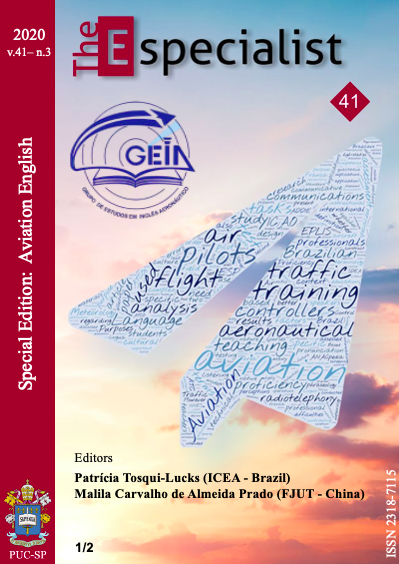The washback of EPLIS on teachers’ perceptions and actions: Implications for reviewing ICAO language policy in Brazil
DOI:
https://doi.org/10.23925/2318-7115.2020v41i3a7Keywords:
, Washback effect, Proficiency test, Aviation English, Language PolicyAbstract
This study investigated the washback effect of the Aeronautical English Language Proficiency Exam for the Brazilian Airspace Control System(EPLIS) on teachers’ perceptions and actions in an Air Traffic Control Initial Training Program. EPLIS has been administered to Brazilian in-service air traffic controllers and aeronautical station operators every year since 2007, in compliance with the International Civil Aviation Organization (ICAO) language proficiency requirements, published in 2003. These requirements set that all professionals involved in international flight operations shall demonstrate a minimum level of proficiency in the English language. In 2014, Brazilian air traffic control authorities decided to extend EPLIS application to pre-service air traffic controllers to supposedly improve learners’ proficiency in the training program. However, the consequences of this decision, whether intended or unintended, positive or negative, had not been appraised yet. Quantitative and qualitative data were collected through questionnaires, interviews and class observations. The results showed that the decision to introduce EPLIS in that educational context actually increased its impact. However, some teachers’ deficiencies in understanding the exam and its demands, along with an underrepresentation of air traffic control tasks in the test, compromised to some extent the intended effects and need to be handled so that ICAO language policy in Brazil can be entirely implemented.
References
ALDERSON, J. C.; D. WALL. 1993. Does washback exist? Applied Linguistics, 14.2: 115-129.
ALDERSON, J. C.; L. HAMP-LYONS. 1996. TOEFL preparation courses: a study of washback. Language Testing, 13.3: 281-297.
ARAGÃO, B. F. 2018. O uso de critérios autóctones no contexto aeronáutico: Contribuições para uma nova escala de proficiência para controladores de tráfego aéreo. In: SCARAMUCCI, M. V. R.; P. TOSQUI-LUCKS; S. M. DAMIÃO (Ed.). Pesquisas sobre inglês aeronáutico no Brasil. Campinas: Pontes. p. 243-269
BURROWS, C. 2004. Washback in Classroom-Based Assessment: A study of the Washback Effect in Australian Adult Migrant English Program. In: CHENG, L.; Y. WATANABE; A. CURTIS (Eds.). Washback in Language Testing: Research, Contexts and Methods. New Jersey: Lawrence Erlbaum Associates. p. 113-128.
CHENG, L. 1999. Changing assessment: washback on teacher’s perspectives and actions. Teaching and Teacher Education, 15.3: 253-271.
_________. 2005. Changing language teaching through language testing: a washback study. Cambridge: Cambridge.
FREDERIKSEN, J. R.; A. COLLINS. 1989. A systems approach to educational testing. Educational Researcher, 18.9: 27-32.
FULCHER, G. 2012. Assessment literacy for the language classroom. Language Assessment Quarterly, 9.2: 113-132.
GREEN, A. 2007. IELTS washback in context: Preparation for academic writing in higher education. Studies in Language Testing 25. Cambridge, UK: Cambridge University Press and Cambridge ESOL.
HUGHES, A. 1993. Backwash and TOEFL 2000. Unpublished manuscript. Reading, UK: University of Reading.
MARCUSCHI, L. A. 2008. Análise da conversação. 6. ed. São Paulo: Ática.
INTERNATIONAL CIVIL AVIATION ORGANIZATION/ICAO. 2010. Manual on the implementation of ICAO language proficiency requirements: Doc. 9835 AN/453. 2. ed. Montreal.
MESSICK, S. 1996. Validity and washback in language testing. Language Testing, 13.3: 241-255.
QI, L. Has a High-stakes test produced the intended changes? In: CHENG, L.; Y. WATANABE; A. CURTIS (Eds.). Washback in Language Testing: Research, Contexts and Methods. New Jersey: Lawrence Erlbaum Associates. p. 171-190.
RETORTA, M. S. 2007. Efeito retroativo do vestibular da Universidade Federal do Paraná no ensino de língua inglesa em nível médio no Paraná: uma investigação em escolas públicas, particulares e cursos pré-vestibulares. Doctoral Thesis, Instituto de Estudos da Linguagem, Universidade Estadual de Campinas. Available at:< http://repositorio.unicamp.br/handle/REPOSIP/269563 >. Access: 25 Jun. 2017.
SCARAMUCCI, M. V. R. 1999. Vestibular e ensino de língua estrangeira (Inglês) na escola pública. Trabalhos de Linguística Aplicada, 34: 7-20.
SCARAMUCCI, M. V. R.; S. R.B. GATTOLIN; C. H. ROCHA; E. T. N. SATO; N. C. AZEVEDO. 2010. Validação do exame de proficiência em Língua Inglesa para profissionais prestadores de serviços de tráfego aéreo do SISCEAB. 2010. Relatório final de pesquisa. Campinas: UNICAMP.
SOUZA, P. R. 2017. O efeito retroativo do EPLIS nas percepções de professores. Brazilian English Language Teaching Journal, 8.1: 5-29. Available at: <http://revistaseletronicas.pucrs.br/faced/ojs/index.php/belt/article/view/26863/0>. Access: 25 Jun. 2017.
______, P. R. 2019. O nível de proficiência como fator mediador no processo de efeito retroativo do EPLIS. Revista Estudos Linguísticos, 48.1: 540-560. Available at: <https://revistas.gel.org.br/estudos-linguisticos/article/view/2151>. Access: 10 Apr. 2019.
SHOHAMY, E. 1993. The power of tests: the impact of language tests on teaching and learning. NFLC Occasional Paper. Washington: National Foreign Language Center, 1993.
__________, E. 2006. Language Policy: Hidden agendas and new approaches. New York: Routledge.
TOSQUI-LUCKS, P. T.; P. R. SOUZA; N. A. RAYMUNDO; N. C. GUERREIRO; B. F. ARAGÃO. 2016. Ensino e avaliação de Língua Inglesa para controladores de tráfego aéreo como requisito de segurança em voo. Revista Conexão SIPAER, 7.1: 44-54. Available at: <http://conexaosipaer.cenipa.gov.br/index.php/sipaer/ issue/view/19>. Access: 25 Jun. 2017.
WATANABE, Y. 2004. Teacher factor mediating washback. In: CHENG, L.; Y. WATANABE; A. CURTIS (Eds.). Washback in Language Testing: Research, Contexts and Methods. New Jersey: Lawrence Erlbaum Associates. p. 129-146.
Downloads
Published
How to Cite
Issue
Section
License
The authors grant the journal all copyrights relating to the published works. The concepts issued in signed articles are the absolute and exclusive responsibility of their authors.


 Esta obra está licenciada com uma Licença
Esta obra está licenciada com uma Licença 